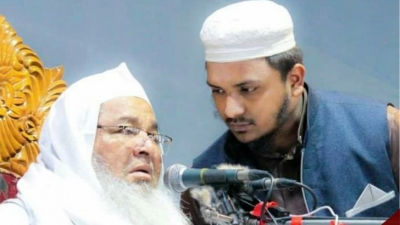
HeI, the Bangladeshi militant group has announced its reorganisation with appointment of new leaders
The re-organisation of Bangladesh’s militant outfit Hefazat-e-Islam (HeI) — as it announced a new 33-member committee under ‘Ameer’ Junaid Babunagari — could lead to a fresh headache for Dhaka and New Delhi.
Though the new organisational restructure has been seen as a desperate attempt by HeI to keep itself afloat after most of its leaders were arrested, analysts told India Narrative that both India and Bangladesh must keep a close watch on the new leaders of the militant outfit especially since the development has been “directly aided and supported by groups in Pakistan.”
However, they hoped that Bangladesh Prime Minister Sheikh Hasina’s focus on rooting out extremism will help in keeping the organisation’s activities in control, even as the leader followed a live and let live philosophy with the HeI till recently.
Also read: Hasina's assault on radicals crucial for peace and development in India and South Asia
While the Chittagong headquartered militant outfit follows the Taliban ethos without the large scale violence, it is essentially controls the Qawmi Madrassas in the country. That gives the organisation a huge and a ready cadre base.
“The new appointments have been done out of turn to pass on a message that the organisation, which has been made rudderless and leaderless by several arrests in the last few months, is in place,” Subir Bhaumik, senior journalist and an expert on South and Southeast Asia told India Narrative.
A report by Dhaka Tribune said that former joint secretary general of Hefazat Mamunul Haque and organising secretary Azizul Haque Islamabadi and other controversial leaders have been excluded from the new committee.
Bhaumik added that with the country’s economic rise driven by a large women workforce, the HeI ethos, considered anti-woman is also getting marginalised.
Also read: 40 years after her return from India, Sheikh Hasina is changing the face of Bangladesh
“PM Hasina's government will surely be keeping a watchful eye on them and their activities. Reorganization of their leadership will not change their Islamist outlook but they will have to be far less provocative in pursuit of their objectives, lest they fall foul of again of Hasina's government,” Pinak Ranjan Chakravarty, visiting fellow at ORF and a former ambassador told India Narrative.
In recent times, several HeI leaders including Mamunul Haque, Rafiqul Islam Madani, also known as "shishu bokta" and Junaid Al Habib among others have been arrested in connection of violence.
Earlier, Dhaka based newspaper the Daily Star said that Haque, who had been collecting money from Pakistan, Dubai and Qatar in the name of Babri Masjid, had links with a Pakistani militant group.
According to the DT report at least 77 cases have been filed against HeI leaders and activists across the country over the clashes and vandalism. “More than 69,000 people were accused in the cases,” the report said.
Also read: Hefazat forms new committee with Babunagari as chief, drops disputed leaders
“Despite Bangladesh being a Muslim-majority country where Muslims are free to practice, and Islam is the state religion, Hefazat feels the need to protect Islam,” Mahir Abrar, lecturer at American International University -Bangladesh wrote earlier in his column in Dhaka Tribune.
“They feel that Islam is in danger but from what? The Islamic Golden Age was an open civilization that encouraged and supported the study of medicine, science, philosophy, and mathematics. People of many faiths and beliefs lived freely in the Islamic word,” Abrar noted.



















